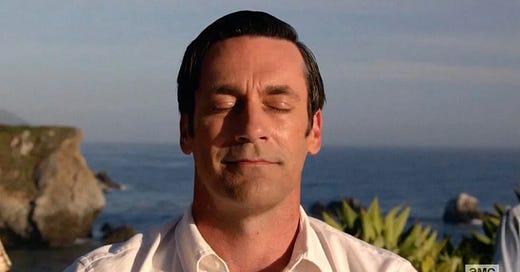I used to be sniffy about self-help books. My view was simple: all you needed to know about life was already available in fiction, poetry, memoir and biography. The wisdom of the ages was already at your fingertips.
What challenged this was two books. The first was a recommendation a few years ago from the elder of my two sons. A Million Miles in a Thousand Years: How I Learned to Live a Better Story, by Donald Miller, encouraged people to think of their lives like a movie, to write their own narrative arc, to make their time on earth a better story.
I enjoyed this more than I expected and took on board some of its thinking. I’m a writer, after all, and narrative is what I do. But still I was resistant to the self-help genre.
Then late last year I read an interview in The Atlantic with the author and journalist Oliver Burkeman, headlined You Are Going To Die. This headline tickled me. I think of myself as someone who is reconciled to mortality, who has built the idea of death into my ideas about life. I see this as my patriotic duty as a dour Scotsman.
As Private Frazer in Dad’s Army liked to say: “We’re doomed.”
I was already a fan of a weekly column Burkeman used to write for The Guardian’s Saturday magazine, called This Column Will Change Your Life. These were pithy exercises in in applied moral philosophy.
Four years ago Burkeman became a best-selling author on both sides of the Atlantic with Four Thousand Weeks. This is one of those books where the message is so neatly conveyed by the title there is almost no need to buy it. Four thousand weeks is, roughly, the time we each have on this planet. Just being aware of that number is a spur to a better, more fulfilling life.
The book’s opening line is: “The average human lifespan is absurdly, terrifyingly, insultingly short.” A blunt truth, but undeniable.
The interview in The Atlantic was intended to promote a spin-off book called Meditation for Mortals. This was a four-week meditation workbook on the themes in Four Thousand Weeks. The idea was simple: you read one short chapter a day for a month, and reflect on its lessons for your life.
I thought: “I could do that.” More importantly, I thought: “I need that.” Why? Because lately I had experienced a change in my life circumstances, one to which I had not quite fully adjusted.
Let me explain.
A while ago I joined the ranks of the semi-retired. I was still a staff writer for The Times but only part-time. The rest of the time I spent writing for you, dear reader, on The Jaggy Thistle. I also spent a lot of time cooking. More generally I mooched around art galleries, second-hand bookstores and coffee shops.
I loved my new-found freedom. I had worked hard for it. I was determined to enjoy it. But my subconscious had other ideas.
Every night brought anxiety dreams. These were all work related. I was a cub reporter sent on a tough job and nobody would give me a quote. I was a court reporter and my shorthand was illegible. I was a sports reporter with an assignment to file “on the whistle” and with five minutes of the match remaining I had not written a word. I was on my first day of a new job in an unfamiliar newsroom with no clue how to work the computer system.
The endless permutations were a tribute to the creative power of the subconscious. Way to go, brain. Nice one. I liked that twist last night, with me deleting a story on deadline by pressing the wrong button.
Something was not right. Something was awry. I needed to get my brain in synch with the life I was now living. Maybe I needed some help.
So I bought the Burkeman book and resolved to read a chapter a day, exactly as stipulated. A month of meditations.
Here is what I learned, day by day, over 28 days. At the end I’ll tell you what impact it had on my life.
-o0o-
Day 1
Keep reading with a 7-day free trial
Subscribe to The Jaggy Thistle to keep reading this post and get 7 days of free access to the full post archives.






